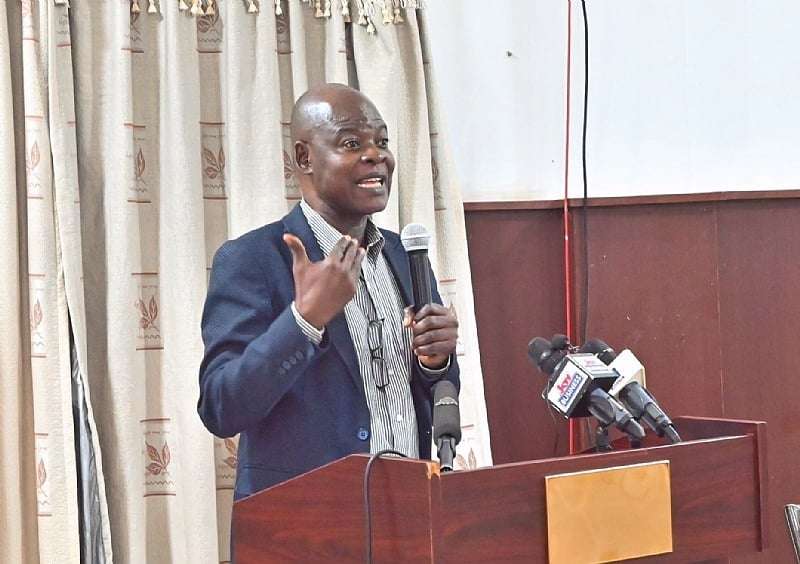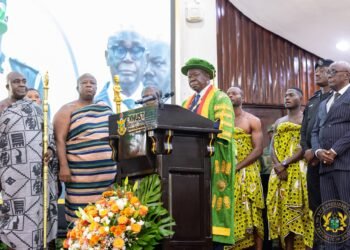The recent ruling by the International Court of Arbitration (ICA) on the ENI/Vitol vs. Government of Ghana case has sparked significant debate and concern among civil society leaders, industry experts, and political figures.
The Attorney-General’s office initially proclaimed a victory for Ghana, claiming that the ruling favored the nation, however, this narrative has been met with substantial criticism and accusations of misrepresentation from various quarters.
Benjamin Boakye, Executive Director of the Africa Centre for Energy Policy (ACEP), and Bright Simons of IMANI Centre for Policy and Education have been vocal in challenging the government’s portrayal of the ruling.
They argued that the statement from the Attorney-General’s office is misleading and fails to accurately reflect the ICA’s decision.
According to Mr Boakye and Mr Simons, the ruling clearly indicates that Ghana breached the Petroleum Agreement by issuing unitisation directives that were not in compliance with the agreed-upon regulations.
Hon. John Abdulai Jinapor, Member of Parliament for Yapei-Kusawgu and Ranking Member of the Mines and Energy Committee, in a detailed critique, expressed grave concern over the government’s misrepresentation of the ICA ruling.
The National Democratic Congress legislator emphasized that the ruling declared Ghana’s unitisation directive as null and void, rendering it ineffective.
“Contrary to the statement put out by the Attorney General’s office, the International Court of Arbitration, in its ruling, states explicitly in paragraph 489 of page 144 that: The Republic of Ghana breached the Petroleum Agreement by issuing the Unitisation Directives in the circumstances in which they were issued;
“ii. Declares that each Party shall bear its own costs; iii. Orders the Republic of Ghana to pay to ENI Ghana Exploration and Production Limited and Vitol Upstream Ghana Limited EUR189,900 for the costs of the Tribunal and SCC”.
Hon. John Abdulai Jinapor—MP, Yapei-Kusawgu constituency and Ranking Member, Mines and Energy Committee
He criticized the government’s handling of the situation, pointing out that despite warnings from the Minority in Parliament and various civil society organizations, the government proceeded with actions that have now led to this unfavorable outcome.

Furthermore, the Ranking Member of the Mines and Energy Committee, Honorable Jinapor underscored the broader implications of the arbitration ruling on Ghana’s upstream oil sector.
He noted that the NPP government inherited three oil fields from the erstwhile Mahama’s administration but has failed to make significant additions to the sector, pointing out that instead, oil production has declined by approximately 32% under the current administration.
Honorable Jinapor further posited that the arbitration creates an impression that Ghana is a hostile and unpredictable business environment and it is likely to deter major oil-producing companies from investing in the country.
“With this statement, we call on the Government to refrain from such unfortunate and immature decisions in the future. We urgently call on the President to intervene and seek an amicable resolution to the impasse between Springfield and ENI to avert any further deterioration and losses in the country’s oil and gas sector”.
Hon. John Abdulai Jinapor—MP, Yapei-Kusawgu constituency and Ranking Member, Mines and Energy Committee
Dr. Steve Manteaw’s Perspective
Dr. Steve Manteaw, Co-chair of the Ghana Extractive Industry Transparency Initiative (GHEITI) and Policy Analyst at the Integrated Social Development Centre, echoed similar concerns.
Dr Manteaw stressed that the primary issue is not whether Ghana won or lost the arbitration but the broader impact on the country’s ability to attract investments into the upstream petroleum sector.
He pointed out that despite numerous roadshows by GNPC and the Ministry of Energy, no new investments have materialized, with companies citing capricious application of rules and regulatory uncertainties as major deterrents.
“The companies are all complaining about the capricious application of rules and regulatory uncertainties, which invariably makes Ghana a hostile business environment. Even our own local businesses are complaining, but WHO WILL HEAR THEM?”
Dr Steve Manteaw, Co-chair of the Ghana Extractive Industry Transparency Initiative (GHEITI), and Policy Analyst and Campaigns Coordinator at Integrated Social Development Centre
Dr Manteaw underscored the need for a stable and predictable regulatory environment to foster investor confidence, arguing that the current situation, marked by inconsistent policies and legal disputes, undermines Ghana’s attractiveness as a destination for oil and gas investments.

The Need for Accountability and Due Diligence
In conclusion, the ICA’s ruling on the ENI/Vitol case serves as a critical reminder of the importance of transparency, accountability, and prudent policymaking. The government’s perceived misrepresentation of the ruling not only damages its credibility but also risks further alienating potential investors.
The ICA ruling and subsequent fallout also highlight the urgent need for accountability from government officials whose actions led to this arbitration and the subsequent embarrassment for Ghana.
Going forward, the government must engage in thorough due diligence and consult with relevant stakeholders before making significant policy decisions that impact the country’s oil and gas sector.
Again, it is imperative for the government to learn from this episode and ensure that future decisions are made with the utmost care and consideration for their long-term implications on Ghana’s energy sector.
READ ALSO: Race to Jubilee House; a Close Contest between NDC and NPP























